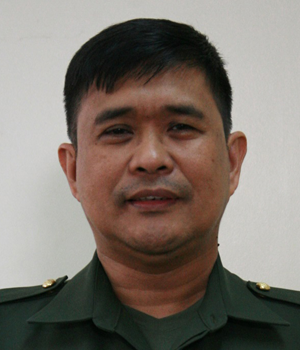No CrossRef data available.
Article contents
Interview with Lieutenant-Colonel Joven D. Capitulo PA
Military Assistant to the Office of the Undersecretary for Defense Policy, Department of National Defense, Republic of the Philippines
Published online by Cambridge University Press: 12 October 2020
Abstract

Protracted conflicts are a major source of human suffering and can cause long-term displacement and development reversals. Although protracted conflicts can take many forms, they are generally characterized by their longevity, intractability and mutability. Authorities involved in situations of protracted conflict face complex challenges, particularly when it comes to ensuring that international humanitarian law (IHL) is respected by their armed forces.
The government of the Philippines has been involved in multiple non-international armed conflicts against insurgent groups for more than fifty years. In this interview, Lieutenant-Colonel Joven Capitulo, who works to implement the policies, activities and programmes of the Philippine Department of National Defense and Philippine Department of Defense initiatives on national legislation pertaining to compliance with IHL, shares the perspective of a State dealing with several protracted situations of non-international armed conflict. He tells the Review about some of the IHL considerations involved when a military is engaged in counter-insurgency on its own territory over a period of decades.
- Type
- Interview
- Information
- International Review of the Red Cross , Volume 101 , Issue 912: Protracted conflict , December 2019 , pp. 977 - 985
- Copyright
- Copyright © icrc 2020
Footnotes
This interview was conducted in Manila on 4 March 2020 by Ellen Policinski, Editor-in-Chief of the Review. Special thanks to Katerina Kappos, Jeffrey Michael Sison and Ethel Avisado from the ICRC delegation in Manila and to Sai Sathyanarayanan Venkatesh from the Review team for their help in preparing this interview.
References
1 The IHL Ad Hoc Committee was created by Executive Order No. 134, 1999, available at: www.officialgazette.gov.ph/1999/07/31/executive-order-no-134-s-1999/ (all internet references were accessed in July 2020).
2 Administrative Order No. 35, “Creating the Inter-Agency Committee on Extra-Legal Killings, Enforced Disappearances, Torture and Other Grave Violations of the Right to Life, Liberty and Security of Persons”, 2012, available at: www.officialgazette.gov.ph/2012/11/22/administrative-order-no-35-s-2012/.
3 Republic Act No. 9851, “An Act Defining and Penalizing Crimes against International Humanitarian Law, Genocide and Other Crimes against Humanity, Organizing Jurisdiction, Designating Special Courts, and for Related Purposes”, 2009, available at: www.officialgazette.gov.ph/2009/12/11/republic-act-no-9851/.
4 Republic Act No. 10530, “An Act Defining the Use and Protection of the Red Cross, Red Crescent, and Red Crystal Emblems, Providing Penalties for Violations Thereof and for Other Purposes”, 2013, available at: www.officialgazette.gov.ph/2013/05/07/republic-act-no-10530/.
5 Republic Act No. 11054, “An Act Providing for the Organic Law for the Bangsamoro Autonomous Region in Muslim Mindanao”, 2018, available at: www.officialgazette.gov.ph/2018/07/27/republic-act-no-11054/.
6 Executive Order No. 70, “Institutionalizing the Whole-of-Nation Approach in Attaining Inclusive and Sustainable Peace, Creating a National Task Force to End Local Communist Armed Conflict, and Directing the Adoption of a National Peace Framework”, 2018, available at: www.officialgazette.gov.ph/2018/12/04/executive-order-no-70-s-2018/.
7 Armed Forces of the Philippines, AFP Development Support and Security Plan “Kapayapaan” 2017–2022, 2017, available at: https://mronline.org/wp-content/uploads/2018/09/AFP-Development-Support-and-Security-Plan-Kapayapaan-2017-2022.pdf.
8 Armed Forces of the Philippines, Internal Peace and Security Plan “Bayanihan”, 2010, available at: www.army.mil.ph/home/images/bayanihan.pdf.


